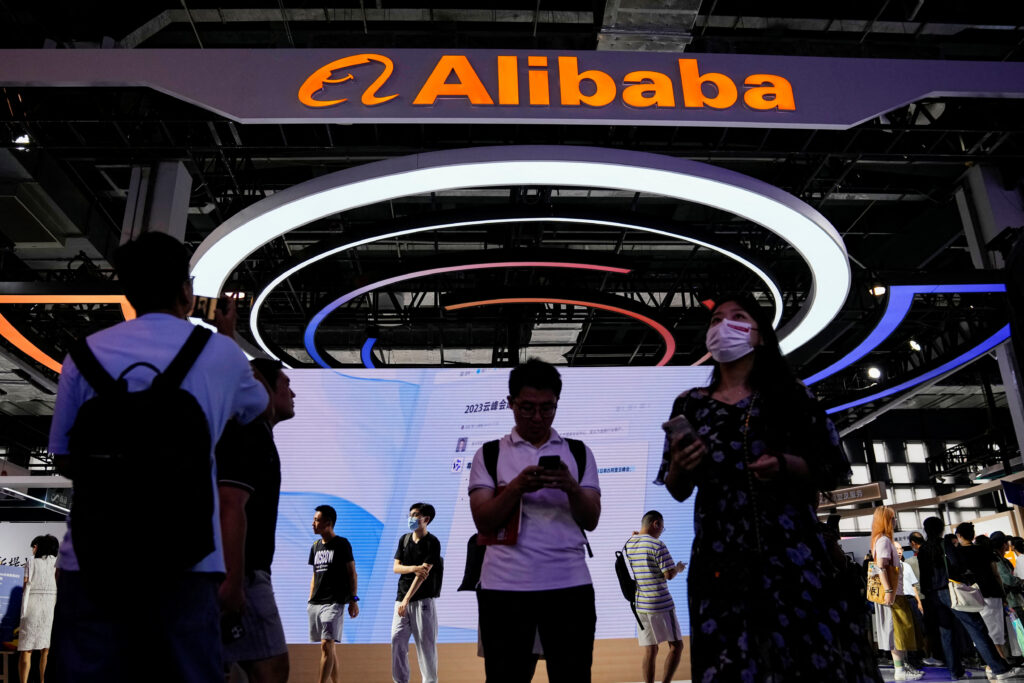HONG KONG, Nov 17 (Reuters) – Investors wiped out some $20 billion off Alibaba Group’s (9988.HK) market value on Friday after it scrapped plans to spin off its cloud business, citing uncertainties over U.S. curbs on exports to China of chips used in artificial intelligence applications.
Alibaba Group’s Hong Kong shares closed down 10%, their biggest single-day drop in more than a year.
It was the first market reaction in Asia since the stunning strategy reversal was announced late on Thursday, after which the company’s U.S. listed securities closed down 9%.
“The shelving is a surprise and makes us wonder if there are issues behind the scenes that we aren’t aware of,” said Jon Withaar, the Singapore-based head of Asia special situations at Pictet Asset Management.
Alibaba’s concerns over the U.S. export curbs announced by Washington in October come on the heels of similar worries raised this week by Chinese social media and gaming company Tencent Holdings (0700.HK) which said the restrictions would force it to seek domestically produced alternatives.
Alibaba, once Asia’s most valuable stock, was worth around $830 billion at its peak in October 2020 but is now valued at less than a quarter of that amount, as the e-commerce company took centre-stage in Beijing’s technology sector crackdown and as the Chinese economy slowed.
Asked if there were any other reasons behind shelving the IPO, Alibaba referred Reuters to remarks chairman Joseph Tsai made during an earnings call on Thursday on how the company planned to invest in its cloud business.
The latest Alibaba news underscores broader hurdles facing China’s tech companies, with the export curbs making it harder for them to get crucial chip supplies from U.S. companies.
In March, Alibaba announced plans to carve out the cloud business as part of a restructuring, the biggest in its 24-year history, that broke the company up into six units.
Analysts had estimated then the cloud division could be worth $41-$60 billion but had warned that its listing could attract scrutiny from both Chinese and overseas regulators due to the reams of data it manages.
The Hangzhou-based company, in announcing its quarterly earnings on Thursday, also put on hold a listing plan for its Freshippo groceries business.
Alibaba Group sign is seen at the World Artificial Intelligence Conference (WAIC) in Shanghai, China July 6, 2023. REUTERS/Aly Song/File Photo Acquire Licensing Rights
Analysts also said that news that the family trust of Alibaba co-founder and former chief Jack Ma planned to sell 10 million American Depository Shares in Alibaba was likely impacting shares.
“Despite no longer being involved in operations, we believe (Ma’s) selling Alibaba at a depressed valuation may hurt sentiment,” UBS analyst Kenneth Fong said in a note.
FOCUS ON AI
On Thursday, Alibaba Chairman Joseph Tsai told a post-earnings call that the company would now focus on growing the cloud business and providing investment for its artificial intelligence (AI) drivers.
Some analysts said keeping the cloud unit could assist Alibaba’s AI push.
“The company believes the chip ban might materially and adversely affect its ability to offer products and services in the longer term. But (it) also points to the increasing importance of retaining the cloud unit given the surging demand for AI computing in China,” said US Tiger Research analyst Bo Pei.
Alibaba reported second-quarter revenue of 224.79 billion yuan ($31.01 billion), in line with the 224.32 billion expected by analysts, LSEG data showed.
Eddie Wu, chief executive of Alibaba, detailed the company’s future strategy on the call, saying that each of its businesses would face the market more independently and that they would conduct a strategic review to distinguish between “core” and “non-core” businesses.
Some analysts said they viewed Wu’s strategy positively and said it was to be expected that he would reassess decisions made by his predecessor, Daniel Zhang, who abruptly quit in September just two months after focusing on cloud computing.
“Giving away the cloud business clearly isn’t the best way to enhance shareholder value any more, given depressed market valuations and the fact that the share price has barely moved since the announcement,” said analyst Vey-Sern Ling from Union Bancaire Privée.
The company also said it will press ahead with a listing of Alibaba’s logistics arm, Cainiao, which applied for a Hong Kong initial public offering in September.
It is also preparing for external fundraising for its international digital commerce unit that houses overseas platforms such as Lazada and Alibaba.com.
Reporting By Donny Kwok and Josh Ye in Hong Kong, Casey Hall and Gu Li in Shanghai; Yelin Mo in Beijing; Ankur Banerjee in Singapore; Writing by Anne Marie Roantree and Brenda Goh; Editing by Muralikumar Anantharaman and Miral Fahmy
: .


